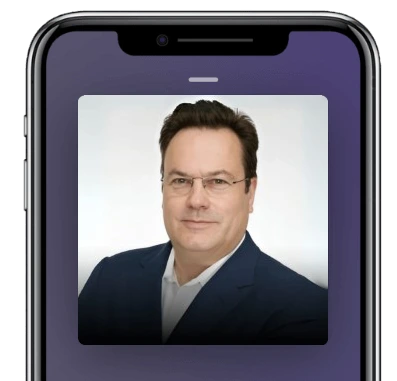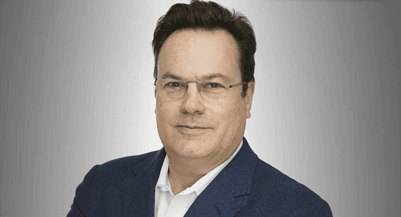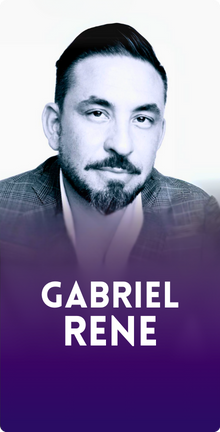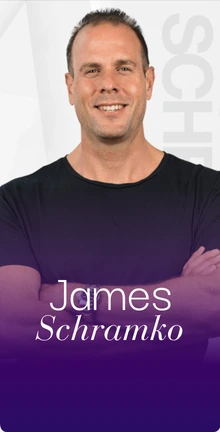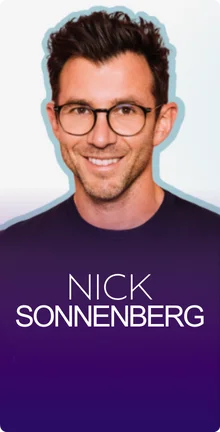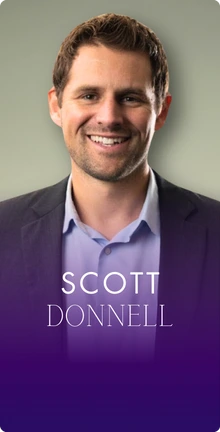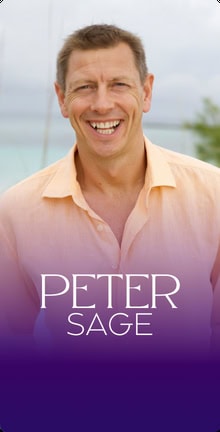In this Episode
- [00:42]Stephan introduces Howard Getson, founder and CEO of Capitalogix, a data science company using advanced A.I. to maximize performance with real-time insights.
- [02:24]Howard speaks about how he got involved in the Tony Robbins event and how he enjoyed the experience.
- [04:25]Howard expounded on the meaning of life in terms of personal, professional and business.
- [05:51]Stephan also reminisces about the time his life was changed not just physically but also spiritually.
- [07:39]Howard agrees that how people cope is one of the most important variables that control the quality of life.
- [08:03]The reasons how Howard got involved with A.I. and the most remarkable things about it.
- [12:15]Examples of different solutions and how choices can dramatically impact the results.
- [16:32]Stephan reiterated Howard’s talk about uncovering distinctions that can make a difference and shares about the concept of the benevolent outcome.
- [18:24]The concept of strategic byproducts and how it relates to life and business.
- [22:36]Howard shares the effectiveness of A.I. in evaluating data in different ways.
- [24:21]He then further explains how automation can help create opportunity and recognize the possibility.
- [29:19]Howard asked the listeners to think about the three things that could dramatically impact the industry in the next three to five years.
- [38:06]Stephan and Howard discuss looking at the strategic byproducts if they are more valuable in the future than the current products.
- [42:57]Howard talks about his book called “Next on Wall Street:- Understanding A.I.’s Inevitable Impact on Markets and Trading.”
- [44:06]Sign up for Howard’s Newsletter by texting AI and sending to 972-992-1100 to receive presentations & a weekly list of new links & read his weekly blog posts by visiting www.blog.capitalogix.com.
Howard, it’s so great to have you on the show.
It’s terrific to be here. Obviously, we’ve known each other for many years. I’ve always kind of labelled you a techno-geek in my head. You wrote this book on SEO. You talked about cybersecurity, all sorts of tools, and yet when I listen to your podcast and look at the stuff you write, you’re focused on personal development on the softer side. What happened to you?
I’ll tell you, I have been in love with personal development ever since I went to a Tony Robbins event in 2009 and it changed my life. This podcast is all about improving oneself and that includes not only your mindset and what’s going on inside, but also has to do with your relationship, your finances, wealth, and business. It’s a pretty all-encompassing podcast.
I totally agree and share a lot of that. Interestingly, I got involved in a Tony Robbins type of world way back in 2004. One of my first investors in this company basically said to me, “I’ll invest in your company but I want a handshake deal that says if I give you good advice, you’ll take it.” I said, “If you give me good advice, of course, I’ll take it.” He says, “No, no, really. I want you to understand. I know how smart you are. I know how focused you are on what you know, but if I talked to you about something that I know, you don’t have to take it but you have to listen and try.” I said, “Okay.” He said, “Shake my hands.” I shake his hand.
When we evaluate how we think, learn, and know things, we tend to make better, smarter decisions and continue to raise the bar and improve performance. Share on XI like this guy already.
He said, “All right, I want you to go to a Tony Robbins seminar with me.” and I said, “The Shallow Hal guy?” He said, “Wait, I just said are you going to take my advice if I know something you don’t.” I said, “All right. I’ll go to a Tony Robbins seminar.“ He says, “It’s next week.” I said, “Next week?” He said, “Yeah, in Brisbane Australia.”
No way.
I’m a person that keeps my word. I bought a ticket to Gold Coast Brisbane, Australia, and I undertake this five-day Date with Destiny process, which is the most intense. But it turns out I loved it and signed up for the Platinum Partner program and did it for three years.
Oh, me too.
I’m still friendly with a whole bunch of those people. I believe that that probably had more to do with my personal operating system than any other. Anyway, I look at my life in terms of personal, professional, and business. For me, personal is me, my mindsets, my family, the way that I think and learn, the way that I know things, the rules, the coding that makes up me. Professional is my career and that’s me and my role of what I do. The business is the business.
I’ll tell you that a strategic coach has been probably the biggest catalyst on the business and professional side. In many respects, it’s personal as well, but I’ll give the nudge to Tony Robbins. I really believe he’s done an amazing job of continuing to learn to curate information from all these diverse sources and explain it in a way that’s actionable for mere humans.

It even occurs to me that on some level, generations from now, people will look at what he did and they’ll consider him a religious figure because so many people have not committed suicide or turned their life around. They’ll say he performed miracles. If you’ve ever been to one of the seminars, it’s amazing.
It’s incredible. I was a platinum for three years myself and I loved it. It changed my life in so many ways. I look completely different than I used to. I don’t know if I have ever shown you my before photo, but this is fun. This was prior to attending my first event at Tony’s. It was 2009, it was UPW. This was what I looked like prior to that event. This was actually a couple years prior to that, that was me.
Wow.
Yeah. A little different. The rest was history. That wasn’t even the biggest impact I had in my life was the physical makeover because I did literally look unrecognizable. People wouldn’t recognize me at conferences. I would speak at a lot of SEO and online marketing conferences and they didn’t recognize me. I’d walk up to a group of people I knew, and they wouldn’t know who I was until they saw my badge. That was really fun.
Of course, those days are long past, everybody knows me as to how I look now. The internal changes, my spiritual changes, my relationship changes have been so profound, much more so even than the physical and it all stems from Tony.
Exponential thinking and exponential technologies are inevitable. A.I. is not something that you can say, 'well, it might catch on.' A.I. is now good enough that it's capable of almost anything specific. Share on XI met my wife on a Date with Destiny. I had a spiritual awakening at a platinum trip in India, his oneness trip, which was incredible. I got touched on the head by a monk—zapped me, gave me a Deeksha oneness blessing—and I saw everything in technicolor. I felt this deep sense of peace and connection, and I was agnostic my whole life up until that point. Big difference.
It turns out that, I think, how people think, how people know, how people code things probably is one of the most important variables or it’s a series of important variables that control the quality of your life. Whether your life is heaven or hell has a lot to do with whether you feel like you’re blessed or cursed.
From a business standpoint, that’s actually a big reason I got involved in AI. Wouldn’t it be cool to evaluate the way people think, learn, and know things so that they make better decisions, ultimately take better, smarter actions, and comparatively continue to raise the bar and improve performance. Tony talks about constant, never-ending improvement, but really, the best businesses aren’t businesses that don’t have problems. Only companies that cease to exist stop having problems. The goal is to have an increasing quality of problems.
Really, AI is a way to accelerate that. I made a joke that AI is a good substitute for the lack of the real thing. I have another one, we have a little piece of artwork on the wall that says, “AI is cool, artificial stupidity is scary.”
The best businesses aren’t businesses that don’t have problems. Only companies that cease to exist stop having problems.
When people ask how I got started in AI, I think it really stems back to something traumatic in my childhood and it’s crazy how many people are impacted by things that happened a long, long, long time ago. Everybody deals with their own stuff. There’s an old Yiddish story that says if everybody came to the center of town, unloaded their baggage, you could see the things that each person is dealing with, everybody would pick their own back up because each is so horrible in and of itself.
For me, I had a brother who died when I was very young. It turns out that I had told my mother that the nanny who was taking care of us was mistreating us. She would lock me in the basement, she mistreated us, but I was young, and my mom didn’t believe me. A few weeks later, my brother ended up dead. It’s traumatic, lots of bad stuff.
I’m so sorry.
Yeah, but the concept is how did somebody decide not to pay attention? How did we not know to take the right action? On one hand, I was young. On the other hand, there’s a signal and there’s noise. I’ll go to Tony for a minute.
One of the most important things that happened to me at a Tony Robbins event was I had a few minutes alone with him. We were in Venice walking from a hotel to the event location and he said, “How are things going?” He says, “I noticed you were working on this, that, or the other.” One of the things I was working on was a way to have a better relationship with my mother.

My relationship with her has been strained for years and he asked me a question. He said, “When a warrior knows the battle’s over, what does he say to his opponent?” I thought about it for a minute, and I said, “Go in peace.” As I said it, you talked about how when you had the Deeksha, the blessing, how you felt physical things. It was almost like The Matrix where I felt a part of me loosening, unclenching. Go in peace, the fight’s over.
The concept that he was doing there was called archetypes. In a sense, as you play a different role, the best next step is different. The warrior wants to fight, the lover wants to love, or the hand of the king wants to advise. These archetypes are common in almost everything.
This actually relates to AI. One of the coolest things about AI is that you can solve a problem mathematically, statistically using behavioral economics, utility function, or common sense. Each one of those solutions might be different. Wouldn’t it be cool to evaluate each of those potential answers using different grades and figure out which one’s actually going to produce the best result?
Instead of simply saying, what’s the best next step or what’s the right answer? You recognize that there’s no such thing as a singular right answer. In the context of trading, is the best system the one that made the most money going back to the beginning of the data set? Is it the one that lost the least money? Is it the one that had the best risk-adjusted return? Was it the one that lost the least money during the crash of 2008? Is it the one that’s going to help you make the most money now?
One of the coolest things about A.I. is that you can solve a problem mathematically, statistically using behavioral economics, utility function, or common sense.
Each of those choices is going to determine a different outcome if you were to try to search for it and archetypes do the same thing. It’s what role allows you to create the best outcome? Then the question is for you, for others, for everyone. It’s actually what makes AI so hard, is there’s no such thing as AI-ing a problem. You can’t look at a business and say, I’m going to AI that. You have to look at the different functional components.
Every business can be looked at as a process that has a beginning, a middle, and an end. It’s weird to think about your business like that, but the thing you do, there has to be the first thing you do, and there has to be the last thing you do. What is it?
Most people when they give me an answer, they then three minutes later say that wasn’t really the first thing because before I do that—and it’s really kind of confusing. If you think about the process, and say, well, I’m not going to get it right, but at least I can bring some order to the chaos, you start to think about the functional components. If I said, hey, think of your business in terms of the top three functional components, you could probably break it into three. But if I said break it into five, you could break it into five too.
Then if I say, all right, here are the five basic things we do. Let’s take the first one of these components. Is there any low-hanging fruit where in that one component what are the ways we solve it? It could be this way, this way, or this way. What new capability would unlock a whole new set of possibilities?
View your life in terms of personal, professional, and business, and find specific ways to help you thrive in each. Share on XYou do the same thing for each of the different components and you end up with a mess. You end up with a lot of stuff that you could do, but then you start to say, if I were to think about a score and I were to rank the decisions…
There’s something in statistics called a value chain where as you look through the different steps of the process, you can wait for the probabilities. Basically, the goal is to make decisions so that you have the highest probability times the highest probability times the highest probability, and you’re trying to capture the greatest real-time expectancy score at the end. In a sense, it’s what you’re trying to do in life as you try to go to the right school, pick the right mate, have the right job, or live in the right city.
The changes or the choices that you make early in your life, dramatically impact the results that you get later. It’s crazy to think how where you decided to go to school, the person you decided to marry, or the peer group you joined, touched, and changed so many things. In a sense, they’re variables that approximately relate to the outcome. In AI or life, there are almost infinite variables. The goal is to figure out which ones to pay attention to to get you the most leverage, the most agency, or degrees of control to impact outcomes.
Tony talks about distinctions and how being able to uncover these distinctions can make the difference between an outstanding life and just a good life. One distinction I just recently learned that takes what you’re describing to a bit of a spiritual level is the concept of the most benevolent outcome. This is from a guy named Tom Moore, an author and a very spiritual guy.

This concept is simply this, that you can’t know all the different variables, you can’t know how everybody is impacted. So when we’re praying for somebody’s healing, we’re praying for an award, or something to change or shift, we’re just looking at the surface level. We don’t see the bigger picture.
The thing that’s happening could be for everybody’s best interest. That war that killed a certain number of people may have stopped a much larger war that would have killed 100 times that number of people. We don’t know that. We just can’t see all that. Praying for the most benevolent outcome takes into account all those different potential futures and all the different myriad ways that people can be impacted—lots of people.
If you pray for the healing of your family member in a way that you’re asking for the most benevolent outcome for that person and for everyone involved, you don’t have to figure out all the different ways people are touched. You just have essentially the universal AI figure that out for you, which is a really interesting concept.
In Strategic Coach, they have a concept called strategic byproducts. While you’re working on your core business or the thing that you think is your core business, you ultimately end up developing these other capabilities, these strategic byproducts. Oftentimes, if you think about them not as the exhaust of your other process but instead a valuable resource, you recognize that by focusing on that, it may lead you to something better. What you’re talking about is the hidden gift or the unintended consequence, but really, it’s even something that I’ll simply label—or something better.
There has to be a way to grade the efficiency, effectiveness, or certainty of the outcome and the long-standing benefits.
I think it’s incredibly important in life or business because for your whole career, this concept of getting better and focusing more narrowly on your unique ability, or the thing that you’re awesome at that gives you energy is something that you get rewarded for and you become increasingly focused on a narrower and narrower subset of possibility.
On one hand, you’re rewarded with money, increased status, stature, and standing in your industry, but it comes at a huge cost. The huge cost is that you could have done something else. It’s the lost opportunity cost of or something better. The same problem is seen in AI, where if you’re only focused on this one outcome, you forget that by looking at the problem a different way or using a different set of data or a different process, you may end up with something that not only is better but makes that other problem irrelevant.
It’s like a new operating system avoids the whole path and gives you a whole new set of possibilities. There has to be a way to grade not only the efficiency, the effectiveness, or the certainty of the outcome, but of the long-standing benefits. It’s not just about doing something with less time, less effort, or with a higher probability of winning, but did you play the right game? Did you win the prize that you wanted to win?
It’s like saying, if you can pick up a $100 bill, why not do it? If there’s a $1000 bill next to it, maybe it’s better to pick up the $1000 bill rather than the $100 bill. Most people are so functionally fixed on what they decided that they forgot that it was a prior version of themselves looking at a prior version of the world with a prior set of rules that chose that target. The real question is thinking forward about what you really want, is that really the target you choose, or is there something better?
The goal is to make decisions that grant you the highest probability in expectancy score at the end. Share on XYeah. It makes me think that maybe there’s a version of the most benevolent outcome that you can program into an AI that takes everything and to account the externalities, the things that aren’t normally considered part of the input set or the decision-making criteria.
I actually believe that that’s one of the things that’s coming. If you think about spiritual practice, even meditation, one of the things you’re supposed to be able to do is disassociate yourself. One of the fundamental precepts of Buddhism is nonattachment to yourself, to outcomes. It’s this concept of, instead of being associated so closely with what’s happening, that the outcome is you and you are the outcome, that you can be the watcher. You can be mindful. You can in a sense see what’s happening.
With AI, I really believe that as AI becomes more and more powerful, it’s becoming more mindful because it can solve things or evaluate things in different ways, and then look at those different ways and consider which one is better. It’s still artificial, in a sense that it’s not organic, but it’s getting there.
You know, it’s funny. As I have some of these thoughts, I think about the fact that we think of ourselves as this body, but no cell in our body was there 20 years ago. Everything has regenerated in a sense. So much of what you are is bacteria, water, RNA, and DNA. There’s just all these parts of you that somehow come together and we say, oh, human or me. But really, at a microscopic level, you’re not really you.
I think about AI and there’s really no such thing as AI. There are thousands of equations, algorithms, automations, and methods. And it’s not like there’s this one AI that rules them all. It’s almost like a Rube Goldberg machine where you knock down the domino, which knocks down other dominoes, which makes the mousetrap go that makes the ball go down the slide, which knocks over the bowling pin that sets off.
I love those, by the way. I love those music videos from OK Go. They have those Rube Goldberg machines in them too.
Yeah, but that’s what automation or your business kind of is. I’ve developed a hedge fund that’s 100% autonomous AI, but I actually look at a lot of the little automation as separate who’s. There’s another strategic coach concept that was really developed by Dean Jackson. It was called Who Not How. And it says, instead of trying to figure out how to do something, think about the who that does that thing that is their unique ability. If they’re not only superior at skill, it gives them energy, and they become masterful. Rather than trying to create a weak substitute for masterful, why not partner with the best masterful who’s?
And I had an epiphany one day that said, who doesn’t have to be a physical embodiment? We can create AI or automation to be the perfect who. If you’re a simplifier, and you’re looking to multiply, technology can be the multiplier. But if you’ve got almost infinite data and you need to figure out where the signal is within all that noise, AI can be the simplifier. And just have to break it down the right way. But I can create a who that doesn’t fight with their spouse, doesn’t have a drinking problem, doesn’t get a poor night’s sleep, and isn’t five minutes late.
You can create much greater certainty and control by figuring out, if there’s something that I’ve done the same way in business for, let’s say, six months, chances are the practical realities of time, technology, competition, innovation, I mean, it’s not really the best way. It might be the best way for me because it’s so easy and it becomes automatic or automatistic. But it’s really an opportunity to say anything that’s not really my unique ability is something that I ought to delegate, automate, or outsource.
How can I find as many of those different things as possible so that it frees me up to lift my chin and focus on something better? And if we continue to think about “or something better”, what does that allow the business to become?
Instead of figuring out how to do something, think about who does that thing that is their unique ability.
I was thinking about succession plans recently. I was buying some key man insurance. I was thinking about I’m 58. My oldest son is about to have what will be my first grandchild. I started thinking, I’m not ready to retire, but I ought to start thinking about a succession plan. I started thinking, what does the word succession mean? And to me, it means to go past or to go beyond, right? But that concept of Who Not How, the concept of saying, I can automate, or I can create technology that goes beyond the human means that in a sense, I’m getting beyond the entrepreneur.
If I’m the constraint in business, we have to go beyond it. I don’t want my limitations to be the limitation of my business. I want to create opportunities and recognize possibilities. For me, I recognize opportunity, talent, and resources. And it’s not just recognizing you have to attract and multiply. But if I’m doing stuff that’s lower level, then I’m not spending those cycles doing the thing that would be more valuable.
And so it becomes important, not to automate everything, not even to automate this thing that you’ve decided is important. But it might be that you automate something that wastes your time or is a blocker for you to think about something else. And by doing that, it creates the space or the clearing for you to then focus on something different or automating the next level. But you don’t have to get everything right. You just have to make progress.
But what about when AI gets so much smarter than us that it’s a thousand times smarter than the smartest human? That’s coming fast, according to Ray Kurzweil.
Well, not just according to Ray Kurzweil.
You don’t have to get everything right. You just have to make progress.
Of course, but he’s the one that comes to mind with these predictions and the years that have been in place for decades now that he’s come up with pretty accurate predictions so far.
I’ve created a framework that I use internally, and I think it’s a good time to talk to you about it. But before I do, I want to pre-frame you by asking you a question. It’s really everybody listening, and I’ll give you a few seconds after I answer to think about it. Think about three things—innovations, technical catalysts, or something new—that you believe are going to dramatically impact your industry in the next 3–5 years. Okay, don’t answer yet, just think for three seconds.
The next step to this is to say, now imagine three things that haven’t been invented but you know are inevitable or likely inevitable that will change your business over the next 5–10 years. And I look at that as having a map before you get lost in the woods. These are not things that you have to build, this is the territory. And then LP says, the map is not really the territory. But on the other hand, it’s a guidepost. And so the concept here is, if you understand that the natural path is going to go from here to there.
The question is, knowing that that’s the likely future in the next 3–5 years, and then the next 5–10 years. What new capability should you focus on that starts to make progress in the right direction so that you’re using your unique ability and your ability to imagine this future? And instead of fighting Mother Nature, you’re leveraging it. It’s way easier to leverage a force of nature rather than to fight it.
And as long as you don’t believe that you have to create those step changes but just take advantage of it, you’ve got a real leg up. Because so many people are wasting time and cycles trying to defend the way they currently do something or to have it the case slower. What this is letting you do is imagine. Let’s just use a metaphor here.
And as long as you don’t believe that you have to create those step changes but just take advantage of it, you’ve got a real leg up.
In 1849, that was the Gold Rush to San Francisco. Everybody was going to look for gold. A lot of the speculators found gold and changed their life. But a whole bunch of the people who got rich wasn’t the speculators. It was the people who recognized that there was a Gold Rush, and they opened hotels, bars, and stores that sold picks and shovels because there was this manifest destiny migration west.
So for me, exponential thinking and exponential technologies are inevitable. AI is not something that you can say, well, it might catch on. Very few companies are really using it meaningfully. They’re using the lowest level automation. On the other hand, AI is now good enough that it’s capable of almost anything specific.
It’s not a general intelligence, and it’s not capable of lots of stuff. But I can find certain techniques, certain tools, and certain ways to improve almost anything. Whether it’s the discovery of a drug, a credit card, using it to detect fraud in your account in a way that a human could never have, or a doctor using it to evaluate your DNA—the biometric data that are being collected from some wearable, and to figure out this, that, or the other. The bottom line is, I know inevitably that it’s going to continue.
I also know that access to data is going to continue to get easier. But if you’re using the same data in the same process as everybody else, you don’t really have an edge. But if you can use a different process, you really can create that asymmetric advantage. These are not things that I’m going, gee, this might be true. These are things that ultimately are inevitable, and it’s not even something I have to invent. It’s something I get to take advantage of.
Focusing more on your unique ability or the thing that you're fantastic at. This is what grants you a more probable success rate. Share on XSo the question is, knowing stuff like that, what new capability helps me do what I already do better? It has to answer the question, so what, who cares? The caveman part of your mind with a new capability, if it doesn’t help you do what you already do better, you say, so what, who cares? And you move on. But the right capability, if you make a list of these capabilities and you’re starting to say, so there’s my lifelong-term roadmap. It’s the three things that I believe are destined to impact my industry over the next 3–5 years. Here’s a couple of things that I suspect are inevitable in the next 5–10. What new capability starts to unlock a whole new set of potential for me?
The way I look at it is, I look at the different things that I wrote down as potential capabilities. And I say, if I really had that, would it satisfy my desire? I’m not looking for the ones that satisfy this desire. I’m looking for the ones that make me hungry for even more. The thing where if I knew I could do that I would go, couldn’t I do that and that? Those are the ones because we’re not predicting technology. We’re predicting human nature. We’re saying, since the beginning of time, humans have been confronted with new disruptive capabilities, but human nature hasn’t changed much.
So in a prediction model, don’t focus on all the things that change. Focus on the thing that doesn’t change human nature. If I can anticipate what people want in my industry and that by giving them that capability makes them want more, I know I’m on the path. So a capability is something that I can do, something that I can create, and it helps me do something that I already know more efficiently, more effectively, and with more certainty.
Think of the capability as a Lego. I want a Lego that makes me want to build something, not just look at the Lego but say, I have a blue one. Let me put it with the yellow one or the red one and if I do it this way, I can create this. So the next step is a prototype, and the prototype in the 80/20 rule is the 20% of something. It’s the quickest, dirty minimum viable something that makes me hungry for the product.
So much more is at a scale that it’s not limited to you. But then there’s a scale beyond that, and that’s the platform.
It’s the thing that instead of it just being me evaluating, it’s probably me and my team accomplishing something that I already know, but we took this new capability, and we added this, and all of a sudden I went, wow, this is so good. If it’s this good for my team, wouldn’t it be cool if we create a product, each one of these is a massive scale opportunity, and the product is where you get people you don’t know to accomplish the thing you do know?
The reason is so much more is at scale that it’s not limited to you. But then there’s a scale beyond that, and that’s the platform. That’s where this capability is so valuable that people want to build on it, and it’s where people you don’t know use it for things you didn’t anticipate. In a sense they’re saying, that capability is so cool, let me come to you with ideas or money. I want to create a variation on a theme for real estate. Or, wow, if I could just use that GPT-3 model for headlines, or not headlines but to fact-check something. No, no, no, not for fact-checking, but SEO.
And so, as you start to imagine the roadmap to the future, the best way to grow your business is to think about how a capability becomes a prototype, becomes a product, and can become a platform that enables the future migration that you know is inevitable.
So you’re, “skating to where the puck is going to be?” to use a Wayne Gretzky quote. It also occurs to me that you should be looking very critically at your strategic byproducts to see if those are more valuable to that potential or inevitable future than your core products are currently.
And then one day I thought about it. But, unfortunately, I was focused on the golden egg, not the goose that lays the golden egg.
That’s the whole point. I’ve got a whole presentation about basically that same concept. And the real point of that is that in my hedge fund, so much of the last ten years has been spent thinking about, how do I maximize the return of the hedge fund? And then one day I thought about it. I was focused on the golden egg, not the goose that lays the golden egg. The strategic byproduct is trying to automate my hedge fund. I created this insight engine. This platform amplifies intelligence and lets you make better decisions, take smarter actions, and continually improve performance. Why limit that?
This is the concept of focus. I was so focused on the hedge fund that it came at the cost of every other thing that I could do with it. So if I could build a hedge fund, why not build hedge funds for other people, or mutual funds, ETFs, or other financial products? Or even use it in VC, to say, let’s look at your portfolio. And as you make one investment, is it better to hedge your bet by making a bigger or smaller investment in the same space (an adjacent space), or a totally reciprocal or difference in space?
Anyway, the concept is easy to understand. Let me make an offer to your group. Anybody who’s listening, I realized that we’re coming to the end of our podcast and we haven’t really discussed this fully. If they text “AI” to (972) 992 1100. Just the letters AI to (972) 992 1100. I’ll send them the presentation of a forum that talks about how thoughts become things or how capabilities become prototypes, become products, become platforms. They’ll also end up getting a weekly list of the news links. It’s very similar to your newsletter, where you send out the five things that you found.
My Thursday three?
For me, I send out 20 links about business and technology and 20 links about business and markets.
Those are great, by the way. I get your newsletter.
You have to start to become aware of things before you can begin making finer distinctions before becoming masterful.
Well, I appreciate that. So anyway, I’ll send your guests the forms to start working on how thoughts become things and also get them signed up for that newsletter. But AI is at the beginning. For me, it’s a true north encompassing 25 years where I can’t imagine Amplified Intelligence not being at the focal point of what’s changing business for the next 25 years, which, at my age, is the next biggest portion of my remaining business life. It’s one of those things that I believe is inevitable. But what’s not inevitable is how you choose to use it.
There’s a model—winter, spring, summer, and fall. It’s not so much of a model as a law of nature, but you can use it to evaluate businesses or cycles. I think almost anybody would say it’s springtime for AI. But it’s not springtime for AI for you if you’re not thinking about how to use it. The law of the farms is you have to plant the seed before you water it, before it grows, and before you can harvest. And so, you’re going to suck at the beginning, but you have to start to become aware of things before you can start to make finer distinctions before you can become masterful.
And be in it to win it.
Yeah, you got to play the game. I heard a joke. There was this pious lady that prayed to God every day, please let me win the lottery, and she did amazing things her whole life. One day, God comes down to earth and meets the lady and says, at least buy a ticket.
That’s awesome.
Also, I’ll just tell you, I’ve written a book called Next on Wall Street: Understanding AI’s Inevitable Impact on Markets and Trading. It isn’t out yet but I did the book with Tucker Max and their scribe media. It’s being edited right now, so I think it’ll come out soon. But I enjoyed your podcast and I’ve enjoyed spending time with you. I really appreciate the opportunity.
Me too. I remember this quote from Peter Diamandis that I heard at Abundance 360, which is, there are going to be two types of businesses at the end of this decade—businesses which use AI in their core and businesses that are out of business. What do you think of that?
Why would you do business with a business that is intentionally limiting its capabilities?
I think it’s like electricity or the internet. I don’t think you think about which companies use electricity. I think people not connected to the internet is a choice so that something is air-gapped. I think at a certain point, it becomes assumed. At a certain point, why would you do business with a business that is intentionally limiting its capabilities? Again, to sign up for the newsletter, just text AI to (972) 992 1100. It’ll help you start to think about places where you can start to plant your seeds and think about the future.
Awesome. One last thought to leave our listener or viewer with is this important truism I learned from Perry Marshall in his 80/20 book, and that is the 80/20 rule is fractal. In other words, there’s an 80/20 of the 80/20. Four percent of what you do will produce 54% of value.
It works the other way too. Fractal is getting smaller and smaller but also bigger. And the concept is that as you develop a technology like the insight engine, that might be your business. For Tesla, the battery, that clean power, will be a company bigger than what you currently see Tesla, or in SpaceX, the Starlink capability that lets our rocket communicate with Earth from far away will become the new AT&T of the universe and will connect worlds. Most people think they’re going to make their money in rockets, but they might make more money with that than they do with anything else. And their rockets may end up being the delivery service interplanetary. It’s not so much about travel as transportation.
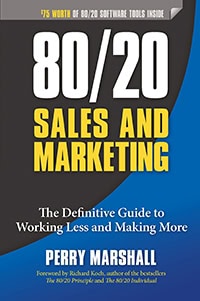
I really like that. Listeners, go take advantage of Howard’s offer. Also, you can read his blog.
It’s www.blog.capitalogix.com. Thanks for doing that I always forget to mention it, but I actually write that every week. I have a major assist from my son Zack. Zack would tell you that he writes 60%–70% of it, and I just had the lipstick on the pig.
Maybe it’s 54% that he writes—no, that would be the other way. Whatever creates the most value.
He’s actually done a great job of taking over most of that, but it still is handwritten by Getson Boys, at least at this point until we train the AI to do it for us.
Awesome. All right, well thank you, Howard. Thank you, listeners. We’ll catch you in the next episode. This is your host, Stephan Spencer, signing off.

